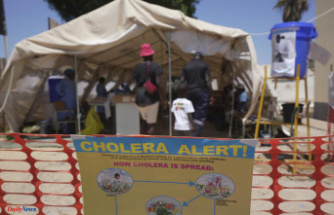It was World Coffee Day recently. However, there are a number of myths surrounding the Wachmacher, the most popular drink among Germans. Some say coffee is addictive, others want to know that coffee helps with hangovers. But what is really true?
Elixir of life, stimulant, luxury food: Germans drink around 150 liters a year on average. There are numerous stories about coffee. Here are the most important facts.
Does coffee stain teeth?
Unfortunately, there is some truth to this. Because if you drink a lot of coffee, you can actually get brownish or yellowish discoloration on your teeth. The reason: the dye from the coffee settles on the rough areas of the teeth, just like with tea or red wine. What helps? A professional tooth cleaning every six months.
Does coffee dry out the body?
Most coffee drinkers have probably heard of this myth, and restaurants and cafés still serve a glass of water with the brown hot beverage to this day. However, this is a superstition. Caffeine has a diuretic effect, but only for a short time. As a result, the water loss from coffee is almost identical to that from other drinks.
Does espresso have more caffeine than filter coffee?
The caffeine content of coffee specialties depends on the type of preparation. The longer the water and bean are in contact, the more caffeine is flushed out. The expression "strong" for the espresso refers solely to the taste, which is created by the special roasting. But not on the caffeine content. This is lower with espresso than with normal filter coffee. A small cup of espresso contains 45 milligrams of caffeine, while a cup of filter coffee contains 100 milligrams.
Does coffee help a hangover?
After an increased consumption of alcohol, a hangover inevitably threatens the next day. In order to get the residual alcohol out of the body as quickly as possible, many swear by a cup of coffee after getting up. Although the hot drink can be refreshing, it has no effect on the alcohol level. Humans break down 0.1 to 0.15 per thousand in one hour - not even the best coffee in the world changes that.
Shouldn't pregnant women drink coffee?
Yes and no. Because caffeine gets into the blood of the unborn child, and there are many indications that very high doses of coffee can harm the child or cause a miscarriage. However, coffee is not strictly forbidden during pregnancy. Most medical professionals assume that two normal-sized cups a day will not harm the child. Because the amount of caffeine contained does not exceed the recommended limit of 200 milligrams per day.
Is coffee addicting?
Many people feel addicted to coffee. Nothing works for them without one or more cups. It's true that the body gets used to regular caffeine intake. And if you suddenly stop using it, you can get withdrawal symptoms like headaches. But this is far from being an addiction in the medical sense. According to the World Health Organization (WHO), coffee is not considered a drug. The reason: No dopamine, i.e. no messenger of happiness, is released during consumption.












